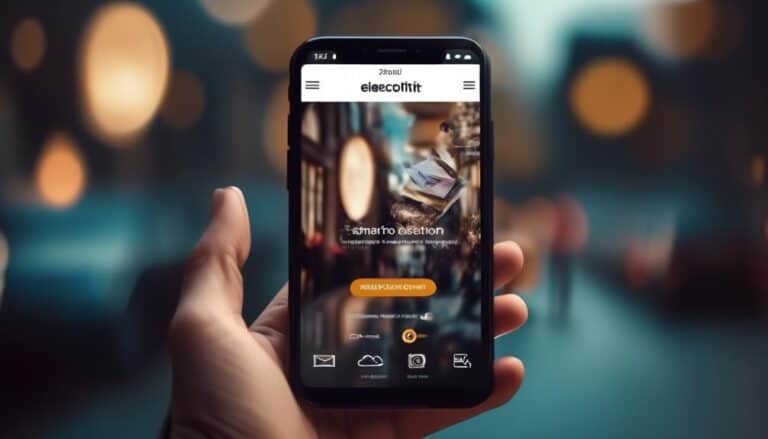The Art of Persuasion: Psychological Techniques for Engaging Email Subject Lines
Are your email subject lines falling flat, failing to grab the attention of your recipients?
Imagine this: you receive two emails with subject lines that read 'Limited Time Offer: 50% Off' and 'Don't Miss Out on Our Exclusive Deal!' Both emails are promoting the same discount, but which one would you be more inclined to open?
The first subject line utilizes the psychological technique of scarcity, creating a sense of urgency and making you feel like you might miss out on a great opportunity.
In this discussion, we will explore various psychological techniques for crafting engaging email subject lines that captivate your audience and increase open rates. Discover how to leverage personalization, curiosity, emotion, and more to create subject lines that compel recipients to click.
Key Takeaways
- Personalization and customization of email subject lines enhance their effectiveness, leading to higher open rates, click-through rates, and conversions.
- Creating a sense of urgency through limited-time offers and time-sensitive promotions drives action and increases perceived value.
- Exclusivity and privilege can be leveraged to make recipients feel special and valued, tapping into their fear of missing out.
- Emotional appeal and social proof are effective in engaging email subject lines, as they relate to recipients' challenges and desires, establish credibility, and build trust.
The Power of Personalization

Personalization is a powerful psychological technique that can significantly enhance the effectiveness of email subject lines. In the world of email marketing, where competition for attention is fierce, personalized subject lines can make a significant impact. By using the recipient's name or incorporating specific details that are relevant to their interests or preferences, you can instantly capture their attention and make them feel valued.
The importance of personalization in email marketing can't be overstated. When a recipient sees their name in the subject line, it creates a sense of familiarity and connection. It shows that you have taken the time to understand their needs and interests, building rapport right from the start. This personal touch can lead to higher open rates, increased click-through rates, and ultimately, more conversions.
Building rapport through personalized subject lines goes beyond simply addressing the recipient by name. It involves tailoring the subject line to match their specific needs or desires. For example, if you know that a customer has recently purchased a product, you can send them an email with a subject line like 'Enjoying your new purchase? Here are some tips to get the most out of it!' This not only shows that you're attentive to their needs but also provides them with valuable information that they'll find useful.
Utilizing the Scarcity Principle
When it comes to engaging email subject lines, utilizing the scarcity principle can be a powerful technique. Limited-time offers, exclusive access, and last chance deals are all effective ways to create a sense of urgency and drive action.
Limited-Time Offers
Limited-Time Offers are a powerful psychological technique that taps into the scarcity principle, compelling recipients to take immediate action and seize the opportunity before it's gone. By creating a sense of urgency, limited-time promotions and time-sensitive offers can drive engagement and increase conversions.
Here are four reasons why incorporating limited-time offers in your email subject lines can be effective:
- FOMO (Fear of Missing Out): Limited-time offers trigger the fear of missing out on a great deal or opportunity, motivating recipients to act quickly.
- Increased Perceived Value: When something is only available for a limited time, it automatically becomes more desirable and valuable in the eyes of the recipient.
- Sense of Exclusivity: Limited-time offers make recipients feel special and privileged, as they're part of a select group that has access to the offer.
- Immediate Action: Limited-time offers create a sense of urgency, prompting recipients to take immediate action rather than postponing or forgetting about it.
Exclusive Access
By leveraging the scarcity principle, incorporating exclusive access into your email subject lines can be a highly effective psychological technique for engaging recipients and driving desired actions.
Offering exclusive benefits and insider perks creates a sense of privilege and importance, making recipients feel special and valued. People are naturally drawn to things that are limited or exclusive, as it taps into their fear of missing out and their desire to be part of something exclusive.
By highlighting the limited availability of certain information, resources, or opportunities, you can create a sense of urgency and encourage recipients to take immediate action. Use subject lines like 'Exclusive Access: Unlock Insider Perks Now' or 'Limited Spots Available: Get Exclusive Benefits Today.'
Last Chance Deals
Utilize the power of scarcity to drive action with last chance deals, compelling recipients to seize the opportunity before it's gone. By incorporating countdown timers and urgency-inducing language, you can create a sense of urgency and motivate your audience to take immediate action.
Here are four effective ways to leverage the scarcity principle in your email subject lines:
- Time-limited offers: Use phrases like 'Last chance,' 'Ends tonight,' or '24 hours left' to emphasize the limited time frame and create a sense of urgency.
- Limited availability: Highlight the scarcity of your product or service by using phrases like 'Limited stock,' 'Only a few spots left,' or 'Almost sold out.'
- Exclusive bonuses: Offer exclusive bonuses or additional incentives to those who take advantage of the last chance deal, encouraging them to act swiftly.
- Personalized reminders: Send personalized emails to remind recipients that time is running out, mentioning the specific deadline and urging them to act now.
Triggering Curiosity With Open-Ended Questions
When it comes to engaging email subject lines, captivating question hooks can be a powerful tool.
By using open-ended questions, you can pique the recipient's curiosity and entice them to open your email.
This technique taps into the natural human desire for answers, making them more likely to click and find out more.
Captivating Question Hooks
Trigger curiosity and engage your email recipients with captivating question hooks that leave them eager for answers. By using engaging storytelling and persuasive language techniques, you can craft subject lines that compel your audience to open your emails.
Here are four effective strategies to employ:
- Open-ended questions: Pose a question that piques curiosity and can only be answered by opening the email. For example, 'Want to double your productivity in just one week?'
- Personalized questions: Address the recipient directly and make them feel like the email is tailored specifically to them. For instance, 'Are you tired of feeling overwhelmed, [Name]?'
- Thought-provoking questions: Ask a question that challenges the reader's current beliefs or assumptions. For example, 'Are you making these common mistakes in your marketing strategy?'
- Future-oriented questions: Spark curiosity about what lies ahead by asking about future trends or opportunities. For instance, 'Are you ready to unlock the secrets of tomorrow's market success?'
With these captivating question hooks, you can capture your readers' attention and increase the likelihood of them engaging with your emails.
Curiosity-Driven Subject Lines
Crafting curiosity-driven subject lines is a powerful strategy to captivate your email recipients and increase their engagement with your messages. By triggering curiosity with open-ended questions, you can tap into the emotional engagement of your audience and pique their interest.
Curiosity is a powerful psychological trigger that compels people to seek answers and satisfy their inquisitiveness. When you pose a question in your subject line, you create a sense of intrigue and anticipation, driving recipients to open your email.
The key is to ask a question that resonates with your audience's desires and challenges. By doing so, you establish a connection and position yourself as a valuable resource.
Harnessing the power of curiosity-driven subject lines can significantly enhance your email open rates and ultimately lead to higher engagement with your content.
Creating a Sense of Urgency

To compel recipients to take immediate action, employ psychological techniques that create a sense of urgency in your email subject lines. By using these techniques, you can effectively capture your audience's attention and motivate them to open your emails. Here are four ways to create a sense of urgency in your subject lines:
- Limited Time Offers: Highlighting time-sensitive promotions or discounts can encourage your recipients to act quickly. Phrases like 'Last Chance!' or 'Ends Today!' create a sense of urgency and prompt immediate action.
- Exclusive Access: Offering exclusive access to a limited number of recipients can create a feeling of exclusivity and urgency. Subject lines like 'Limited Spots Available' or 'Exclusive Invitation' make the recipient feel special and motivated to take action.
- Countdowns and Deadlines: Incorporating countdowns or deadlines in your subject lines can create a sense of urgency and encourage recipients to act before time runs out. Phrases such as 'Only 24 Hours Left!' or 'Limited Time Offer Ends Soon!' create a sense of urgency and prompt immediate action.
- Scarcity Techniques: Emphasize limited availability or limited stock to create a sense of scarcity. Subject lines like 'Limited Quantity Alert' or 'Almost Sold Out!' tap into the fear of missing out and drive recipients to take action quickly.
Eliciting Emotion Through Emotional Appeal
To effectively engage recipients and evoke a strong response, it's crucial to tap into their emotions through targeted emotional appeal strategies. Empathy-driven messaging and storytelling techniques are powerful tools that can help you achieve this goal.
When crafting your email subject lines, consider the emotions you want to evoke in your audience. Empathy-driven messaging involves understanding and relating to your recipients' feelings and needs. By showing that you understand their challenges or desires, you create a connection that compels them to open and engage with your email.
Storytelling techniques are another effective way to elicit emotion in your email subject lines. Humans are naturally drawn to stories, and incorporating storytelling elements can make your email more relatable and compelling. By using anecdotes, personal experiences, or even fictional narratives, you can evoke emotions that resonate with your recipients.
For example, instead of a generic subject line like 'New product launch,' try something like 'Discover the life-changing benefits of our revolutionary product.' This subject line taps into the recipients' desire for improvement and creates curiosity, prompting them to open the email.
Using Social Proof to Build Trust

Using social proof is a powerful technique to establish credibility and build trust with your audience. When people see that others have had positive experiences with your product or service, it builds confidence and makes them more likely to trust you.
Here are four ways you can use social proof to build credibility:
- Testimonials: Including testimonials from satisfied customers in your email subject lines can be highly effective. Testimonials provide real-life examples of how your product or service has helped others, giving potential customers a reason to trust you.
- Reviews: Similar to testimonials, reviews provide social proof of the quality and value of your offering. Including positive reviews in your subject lines can grab the attention of your audience and make them more interested in what you have to offer.
- Social media mentions: If your product or service has been mentioned or recommended by influential individuals or popular social media accounts, it can significantly boost your credibility. Highlight these mentions in your subject lines to show your audience that your offering is trusted and endorsed by others.
- Case studies: Sharing detailed case studies that demonstrate how your product or service has solved a specific problem can be incredibly persuasive. Use subject lines to tease these case studies, showing your audience the concrete results your offering can deliver.
Leveraging the Fear of Missing Out (FOMO)
Leveraging the Fear of Missing Out (FOMO) can be a highly effective psychological technique to captivate your audience and drive engagement with your email subject lines. By tapping into people's emotional triggers and creating a sense of urgency, you can compel them to take action and not miss out on what you have to offer.
Humans are wired to seek connection and belonging, and FOMO plays on these innate desires. When you craft subject lines that highlight limited availability or time-sensitive opportunities, you trigger a fear of missing out on something valuable. This fear drives individuals to open your emails and take immediate action to avoid feeling left out.
To effectively leverage FOMO, use language that evokes urgency and exclusivity. Phrases like 'limited time offer,' 'don't miss out,' and 'only available to a select few' can create a sense of urgency and exclusivity. Incorporating numbers and deadlines can further enhance this effect.
However, it's essential to strike a balance and avoid overusing FOMO in your subject lines. If every email is designed to induce fear of missing out, your audience may become desensitized or even annoyed. Use FOMO sparingly and strategically to maintain its impact and keep your audience engaged.
Incorporating the Principle of Reciprocity

By appealing to the innate human desire for reciprocity, you can further engage your audience and increase the effectiveness of your email subject lines.
Incorporating the principle of reciprocity in your subject lines can create a sense of obligation in the recipient, increasing the likelihood of them opening and engaging with your email.
Here are four ways you can leverage the principle of reciprocity in your email subject lines:
- Offer mutual benefits: Highlight the benefits that both parties can gain from opening and engaging with your email. By showing that you have something valuable to offer, you create a sense of reciprocity in the recipient.
- Frame your email as a reciprocal favor: Use language that suggests the recipient is doing you a favor by opening and engaging with your email. People are more likely to reciprocate when they feel they're doing someone a favor.
- Provide exclusive content or offers: By offering exclusive content or special deals, you're giving something valuable to the recipient, which triggers the desire to reciprocate. Make it clear in your subject line that the recipient will receive something exclusive in return for opening your email.
- Personalize your subject lines: Tailor your subject lines to each recipient's individual interests or preferences. By showing that you have taken the time to understand their needs, you create a sense of reciprocity and increase the chances of them engaging with your email.
Incorporating the principle of reciprocity in your email subject lines can be a powerful tool for engaging your audience and increasing the effectiveness of your emails. By offering mutual benefits, framing your email as a reciprocal favor, providing exclusive content or offers, and personalizing your subject lines, you can create a sense of obligation and increase the chances of your emails being opened and engaged with.
Frequently Asked Questions
How Do I Effectively Use Personalization in Email Subject Lines?
To effectively use personalization in email subject lines, incorporate techniques that create a sense of individualization. By tailoring subject lines to the recipient's interests or needs, you can create compelling and personalized messages that grab their attention.
What Are Some Examples of Open-Ended Questions That Can Trigger Curiosity in Email Subject Lines?
Open-ended questions in email subject lines can ignite curiosity and prompt engagement. They create a sense of intrigue and encourage recipients to open and explore further. Curiosity triggers like these can greatly enhance your email marketing efforts.
How Can I Create a Sense of Urgency in My Email Subject Lines Without Being Too Pushy?
To create a sense of urgency in your email subject lines, try incorporating scarcity and using power words. This can motivate your recipients to take immediate action without coming across as too pushy.
What Are Some Effective Ways to Elicit Emotions Through Email Subject Lines?
To elicit emotions through email subject lines, use psychological techniques that captivate your audience. Trigger their emotions by crafting subject lines that resonate with their desires and needs.
How Can I Use Social Proof to Build Trust in My Email Subject Lines?
Want to build trust in your email subject lines? Incorporate social proof. By using testimonials, reviews, or endorsements in your subject lines, you can show others that your product or service is reliable and trustworthy.
Conclusion
In conclusion, mastering the art of persuasion in email subject lines is crucial for engaging readers and driving action. By utilizing techniques such as personalization, scarcity, open-ended questions, urgency, emotional appeal, social proof, and the fear of missing out, you can effectively capture your audience's attention and compel them to take the desired action.
Remember to always keep your emails concise and compelling, ensuring that your subject lines are persuasive and enticing.








